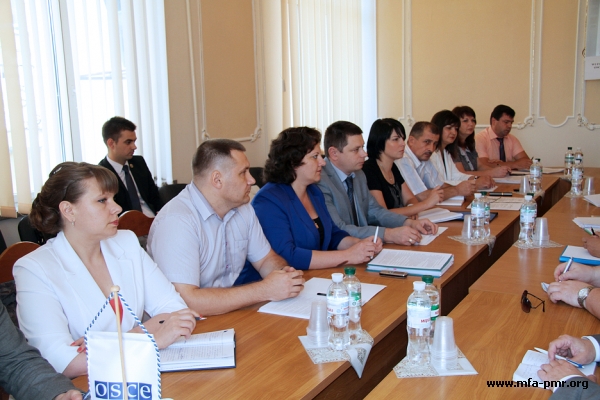Within the visit of the Special Representative of the OSCE Chairman-In-Office Radojko Bogojevic to Pridnestrovie the office of the OSCE Mission in Tiraspol hosted the heads of expert groups from Pridnestrovie. The event was also attended by Deputy Prime Minister for International Cooperation, Minister of Foreign Affairs of the PMR, Pridnestrovian Political Representative in the negotiation process Nina Shtanski.
During the meeting the heads of expert groups from Pridnestrovie voiced Mr. Bogojevic their positions regarding the current state of affairs in groups. Particular attention was paid to the problems of forced documenting of Pridnestrovian citizens, activities of Romanian schools in Pridnestrovie, authentication, legalization and nostrification of Pridnestrovian education documents. There were also broached the issues in the field of foreign economic activity of Pridnestrovian enterprises, organization of railway communication through the territory of Pridnestrovie, environmental issues, measures aimed at protecting the Dniester river ecosystem, etc.
Summarizing results of the conversation, Nina Shtanski expressed hope that mentioned problematic agenda in the dialogue of the parties at the expert level would be narrowed, not expanded, and the experts would be able to develop projects of specific solutions by the planned round of negotiations in the “5 +2” format in September. The Head of the Foreign Service of Pridnestrovie reiterated the low level of trust in the relationship of the parties, both at the level of political representatives, and at the level of expert groups.
"Political representatives may deeply understand the problem, but to generate substantive decisions they need initiatives from below - from the experts. What is now happening in expert groups can be characterized, unfortunately, as meetings for meetings, meetings for reports, "- commented Nina Shtanski to the media.
Another problem in the work of the experts, according to the Head of Pridnestrovian diplomacy, is “unwillingness to develop creative solutions”. In particular, to solve a set of problems the Pridnestrovian side is ready to make certain concessions, including those that may require adjusting of the legislation - the Moldovan side, on words expressing willingness to solve problems, demonstrates a categorical refusal to accept such measures.
“This is unacceptable to neutralize the importance of the negotiation process in the "5 +2" format, replacing it with an exchange of complaints” – voiced her opinion the Pridnestrovian diplomat. For the negotiation process to remain "alive", a "field work" is needed, she said, that means quality activities of expert groups and qualitative study of issues of each of the parties individually.
At the same time the primary responsibility for the negotiation process, the minister noted, lies on the shoulders of the representatives of the parties on political issues: they should give impetus to the work of experts in the conditions when the latter often cannot even fix the outcome of discussions in the relevant protocols.
The problems, voiced during the meeting with the experts and the Special Representative of the OSCE Chairman-in –Office, Nina Shtanski promised to convey to the political representative of Moldova Yevgeny Karpov at a meeting which will be held on July 3 this year in Chisinau.









